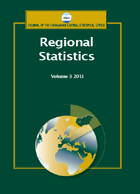New trends in the development of Hungarian clusters: The case of the Southern Great Plain region
New trends in the development of Hungarian clusters: The case of the Southern Great Plain region
Author(s): Lívia Berkecz-KovácsSubject(s): Social Sciences, Economy, Geography, Regional studies
Published by: Központi Statisztikai Hivatal
Keywords: clusters; cluster development; knowledge-based economy; territorial development; accredited clusters; Southern Great Plain region
Summary/Abstract: Most clusters in Europe were established in the late 1990s and the subsequent decade. These network collaborations played a crucial role in the European Union as well as in the economic policies of its member states. Initially, the aim was to catalyse the formation of these clusters and to strengthen their organisational and operational backgrounds. Consequently, several such collaborations were able to serve as the foundation for cluster-based economic development programs. The cluster development process has made great progress in the last 10 years, and the focal points have been rearranged in accordance with emerging global trends and economic challenges. The aim of this study is to provide an overview of these changes and to analyse how the Hungarian clusters adapted to these new trends. The paper is based on in-depth interviews conducted within the clusters operating in the Southern Great Plain region of Hungary, and the results highlight the development processes and some geographical features of these networks. In general, the most important change is that fewer dedicated resources are allocated for the development of clusters, resulting in a shift in emphasis toward support for developed world-class clusters operating in emerging industries. International relations, inter-cluster co-operations, and non-financial incentives have all gained increased focus. The clusters in the Southern Great Plain region have partly adapted to these changes, but active participation in international markets remains a major challenge.
Journal: Regional Statistics
- Issue Year: 8/2018
- Issue No: 01
- Page Range: 78-95
- Page Count: 18
- Language: English

